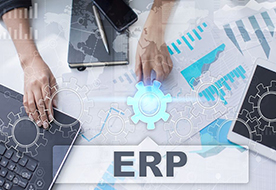 Quite a familiar term in the corporate sector, ERP is singlehandedly managing the innovative advancements and growth of the companies. With rising popularity, most of the budding enterprises are heavily investing upon ERP owing to its technical flexibility and outstanding performance across the verticals of an organization. A set of integrated software, ERP is an application which manages and administers the flow of data by automating the business process and avoiding any kind of data duplicity or manual error. Irrespective of the size of the business, ERP is advisable to be implemented in the business process of an organization as it can ensure a more significant growth for the company with its accurate and customer-oriented solutions.
Quite a familiar term in the corporate sector, ERP is singlehandedly managing the innovative advancements and growth of the companies. With rising popularity, most of the budding enterprises are heavily investing upon ERP owing to its technical flexibility and outstanding performance across the verticals of an organization. A set of integrated software, ERP is an application which manages and administers the flow of data by automating the business process and avoiding any kind of data duplicity or manual error. Irrespective of the size of the business, ERP is advisable to be implemented in the business process of an organization as it can ensure a more significant growth for the company with its accurate and customer-oriented solutions.
Some of the benefits of implementing ERP systems in business processes, which provide innovative approaches to real-life business solutions, are mentioned below.
- Improved Decision Making: By introducing a shared database across every department of an organization, ERP ensures effective internal communication. A communal understanding among the employees enhances the capability of decision making which are effective and future-oriented. This internal compatibility within the employees not only improves the productivity of individual employees but also significantly boosts the overall productivity of the organization.
- Adaptation as per the Organizational Need: ERP systems are modular in nature. Enabled with advanced technologies like the Internet of Things (IoT), Artificial Intelligence (AI), and Machine Learning (ML), the ERP can be evolved as per the requirements of the company. ERP systems perform a steady analysis of the features of the organization. As the features of every company are different with different needs to satisfy, ERP enables a customized business application suitable for the company objectives.
- Lower Cost and High Returns: ERP assists in the reduction of business costs significantly due to improved business decisions, a focused growth towards objectives as well as adopting a future-oriented management. Due to better products and services the profit margin of the organization enhances as well. This helps in the reduction of business costs as well as high returns for the company, enhancing the financial stability of the organization.
- Quality Customer Relationship: Maintaining an efficient customer base is important for every organization. As the implementation of ERP ensures fewer errors and more accurate results, it enables better customer relationship management. Implementing ERP also allows the business to respond to the customers at a faster pace and ensures a quick solution to the problem due to its faster traceability effect and database management. ERP adopts the module CRM (Customer Relationship Management) which makes it more successful when it comes to customer management.
- Secured Data: Incorporating many important features such as automation which leads to the avoidance of data redundancy, better security, control and traceability ERP enhances the overall productivity of the business. With limited access and authorization, it ensures the safety and security of the important business information. Its automation capability not only saves time by reducing the efforts of manual jobs but also ensures a secured data management. With a centralized database to store and access data, ERP holds secured backups for every important data in case of any unavoidable data leakage situations.
 Quite a familiar term in the corporate sector, ERP is singlehandedly managing the innovative advancements and growth of the companies. With rising popularity, most of the budding enterprises are heavily investing upon ERP owing to its technical flexibility and outstanding performance across the verticals of an organization. A set of integrated software, ERP is an application which manages and administers the flow of data by automating the business process and avoiding any kind of data duplicity or manual error. Irrespective of the size of the business, ERP is advisable to be implemented in the business process of an organization as it can ensure a more significant growth for the company with its accurate and customer-oriented solutions.
Quite a familiar term in the corporate sector, ERP is singlehandedly managing the innovative advancements and growth of the companies. With rising popularity, most of the budding enterprises are heavily investing upon ERP owing to its technical flexibility and outstanding performance across the verticals of an organization. A set of integrated software, ERP is an application which manages and administers the flow of data by automating the business process and avoiding any kind of data duplicity or manual error. Irrespective of the size of the business, ERP is advisable to be implemented in the business process of an organization as it can ensure a more significant growth for the company with its accurate and customer-oriented solutions.